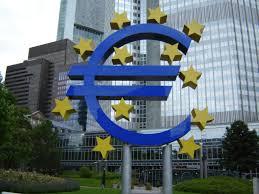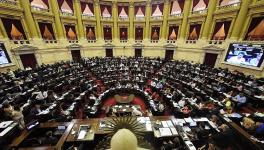Assistance to Portugal and Greece was a Rescue for German Banks
The narrative that Germans told themselves about the Euro crisis having to do with the south needing their money is incorrect, says the ex- advisor of Durão Barroso.
Philippe Legrain was an independent economic advisor of José Manuel Durão Barroso, president of the European Commission, between February 2011 and February of this year. This permitted him an insider’s perspective on the key dealings of the management of the Euro crisis. His highly critical opinion on what was done by the leaders of the Euro is now published in his new book “European Spring: Why Our Economies and Politics are in a Mess - and How to Put Them Right”.
The thesis of your book is that the management of the debt crisis, or the Euro crisis, was completely inept, wrong and irresponsible and that all the economic and social consequences could have been avoided. Why did it happen this way? What happened?

Image Courtesy: wikipedia.org
A big part of the explanation is that the banking sector dominated the governments in all countries and the institutions of the Euro zone. That is why when the financial crisis exploded everyone ran to save the banks, with very serious consequences for public finances and without solving the problems of the banking sector. The problem became European when the issues regarding Greece’s public debt came into light. What would have been the sensible thing to do – and what many people said in private at the IMF, something that the IMF then publicly said last year – was to restructure the Greek debt.
The treaty of the European Union (EU) has a “no bailout” rule [it’s forbidden to take on the debt of Euro countries by its partners] – which is the base of the creation of the Euro, which should have been respected. The IMF should have solved the problem of Greece, which would have put Greece into default, restructure the debt and lend money so that they could get back on track. It’s what is usually done in any other country, anywhere else. But this was not done, partially because of arrogance – and a discourse such as ‘we are Europe, we are different, and we don’t want the IMF to interfere in our affairs’ - but mainly because of the political power of the French and German banks. It’s worth underlining that at that time there were three Frenchmen at key leadership positions; the European Central Bank (ECB) – Jean-Claude Trichet ; the IMF – Dominique Strauss-Kahn; and from France – Nikolas Sarkozy. These three Frenchmen wanted to limit the losses of French banks. Angela Merkel, who initially was very reluctant about breaking the “no bailout” rule, ended up letting herself be convinced by the lobbies of German banks and by the persuasion of these three Frenchmen. This is what provoked the Euro crisis.
How so?
Because the decision of lending money to a bankrupt Greece, immediately transformed bad private bank loans into liabilities between governments. What started by being a banking crisis that should have united Europe in an effort of limiting the banks, ended up by being a debt crisis that divided Europe between creditor countries and debtor countries. And in Europe, the European institutions function as instruments for the creditors to impose their will to the debtors. We can see that very clearly with Portugal: the troika (of creditors, Euro zone and the IMF) played an almost colonial, imperial role, and without almost any democratic control. It did not act in the interest of Europe, but in fact in the interest of Portugal’s creditors. And even worse, imposing the wrong policies. It is bad enough to have an imperialistic boss without any democratic basis, but it is even worse when this boss is imposing in the wrong way. That became clear when instead of facing the problems of the banking system, Europe entered in a marathon of collective austerity, provoking long and unnecessarily severe recessions that aggravated the situation of the public finances. That was what clearly happened in Portugal. People praise the success of the Portuguese program, but you just have to look at the initial forecasts for the public debt and see the situation now to understand that it’s not, in any way, a well-succeeded program. Portugal is more in debt than before because of the program and private debt has not fallen. Portugal is actually in a worst state than it was at the beginning of the program.
What do you mean by saying that Governments and institutions were dominated by banks?
I mean that the Governments put the interests of banks before the interests of citizens. For many reasons. In some cases because the Governments categorize banks as being good national champions. In other cases it has to do with financial ties. Many senior politicians either worked for banks before or hope to work in a bank afterwards. There is an almost corrupt relationship between banks and politicians. In my book I defend the position that when a person has tutelage over an institution, they shouldn’t be authorized to work in that same institution afterwards.
You also mention in your book that when you were Durao Barroso’s adviser, you clearly advised him at the beginning about what should be done, that is, cleaning the balances of banks and restructuring Greece’s debt. What happened? Did he not understand what was in stake, or did he understand but did not want to face France and Germany?
I want to underline that this is nothing particular. President Barroso had the sufficient openness to understand that the high officials of the European Commission were proposing the wrong recipes. He saw me on TV, he read my previous book (*) and asked me to work for him as a councilor in order to give him an alternative perspective. That was courageous, and it gave me the opportunity to try to make a difference. Unfortunately, even if we had a lot of very good private conversations, my advice was not followed.
Why? Could it have been that the Commission simply did not understand? The Commission had the reputation of not having the knowledge nor the experience to handle a crisis of this magnitude. Was that the problem?
There were several problems. Clearly, the Commission and its high officials had no experience at all on how to deal with a crisis. It was a joke! The IMF is always seen as a hated institution [by the troika], but when it went together with the Commission to Ireland, the IMF was more appreciated because they knew what they were talking about, while the Commission had no idea. That is why, one of the problems was the complete inexperience, and even worse, inexperience aggravated with arrogance. Instead of saying, “I don’t know how this works, I will ask the IMF or I will see what happened with previous crises in Asia or Latina America”, the European officials acted as if they were thinking, “even if I don’t know anything, I will pretend I know better”. They were incapable and arrogant. The second reason is institutional: there were no mechanisms to deal with the crisis, therefore the management necessarily processed the crisis through governments. And the biggest creditor, Germany, assumed a particular point of view. This does not absolve the Commission, since many of the high officials such as Olli Rehn [responsible for economic and financial matters], shared the German vision. Also because the role of the Commission is to represent the European interest, and the European interest should have been to try to reach a different type of consensus, or at least generate some debate. The Commission could have had a much more constructive role as an alterative to the single German way. And finally, even if politically weak, the Commission has a great institutional power. All bureaucracies like to gain more power. And in this case, the Commission received centralized powers strengthened not only in this crisis, but potentially forever, which gives it the possibility of forcing countries to do things that before they couldn’t impose. That is why part of the answer is also a power grab.
*Journalist. Correspondent in Brussels, Portuguese newspaper Público. Translation: Anette Dujisin
Courtesy: Other News
Original article in Portuguese: http://www.publico.pt/economia/noticia/ajudas-a-portugal-e-grecia-foram-resgates-aos-bancos-alemaes-1635405
Get the latest reports & analysis with people's perspective on Protests, movements & deep analytical videos, discussions of the current affairs in your Telegram app. Subscribe to NewsClick's Telegram channel & get Real-Time updates on stories, as they get published on our website.
























